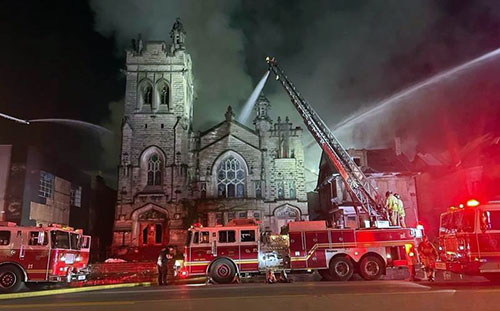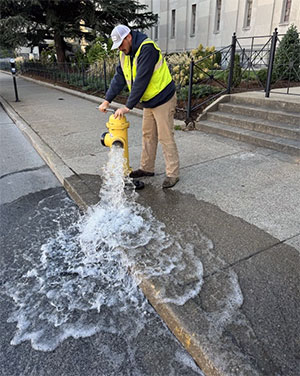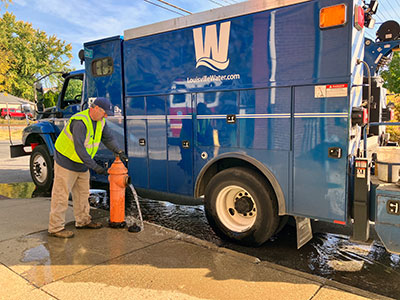
Local firefighters had their work cut out for them during National Fire Prevention Month with a couple of big blazes. You may have seen the historic (vacant) church that went up in flames on East Broadway in downtown Louisville on October 11. Firefighters worked for hours to douse the flames and hot spots. Louisville Fire & Rescue relied on an abundant supply of water which Louisville Water provided.
Additionally, Louisville Water has a team dedicated to maintaining more than 25,000 fire hydrants year-round. So, what happens after a fire, particularly large fires that require thousands of gallons of water?
“The fire department will contact Louisville Water,” said Plumber Leader Chris Meeks. Intense fires will “definitely wear on the gaskets and O-rings and all the stuff we replace,” he said.
Coincidentally, that church fire happened during Fire Prevention Week. Meeks and Plumber Leader’s Assistant Sam Keehner were in the area the next day and stopped by, but firefighters were still on the scene ensuring the fire was out and wouldn’t rekindle.
 “We’ll basically go the perimeter. We’ll test the hydrants, flow them, take the caps off; we’ll put the caps on and do a static test, that forces water out of any areas that may be leaking,” Meeks explained.
“We’ll basically go the perimeter. We’ll test the hydrants, flow them, take the caps off; we’ll put the caps on and do a static test, that forces water out of any areas that may be leaking,” Meeks explained.
He and Keehner returned a few days later to do just that.
Meeks has seen hundreds of fires over the years in his role on the hydrant crew. It’s not out of the question for a fire department to request Louisville Water to be on-site to assist them. Meeks remembered a fire several years ago that had the potential to flare up quickly.
“A big pile of rubber tires and they would not go out (stop burning), so it was day after day after day. They (fire department) actually wanted us on scene. We stayed 16 hours.”
 It’s a job he and Keehner, who is fairly new on the hydrant crew, take seriously.
It’s a job he and Keehner, who is fairly new on the hydrant crew, take seriously.
“We take pride in it, making sure we do it right, make sure it flows, no leaks,” Keehner shared.
Fire protection was a primary reason Louisville Water was founded and continuing that partnership is important to everybody involved, especially when you consider that Louisville Fire & Rescue responded to more than 47,000 incidents last year according to Lt. Colonel Bobby Cooper.
Cooper, who serves as the Assistant Chief of Administration, said more than 700 of those were building fires. He added the fire division tends to see an increase in fires during the “cold weather” months.
Louisville Water crews will begin winterizing hydrants in November to make sure they’re ready for the colder temperatures.

